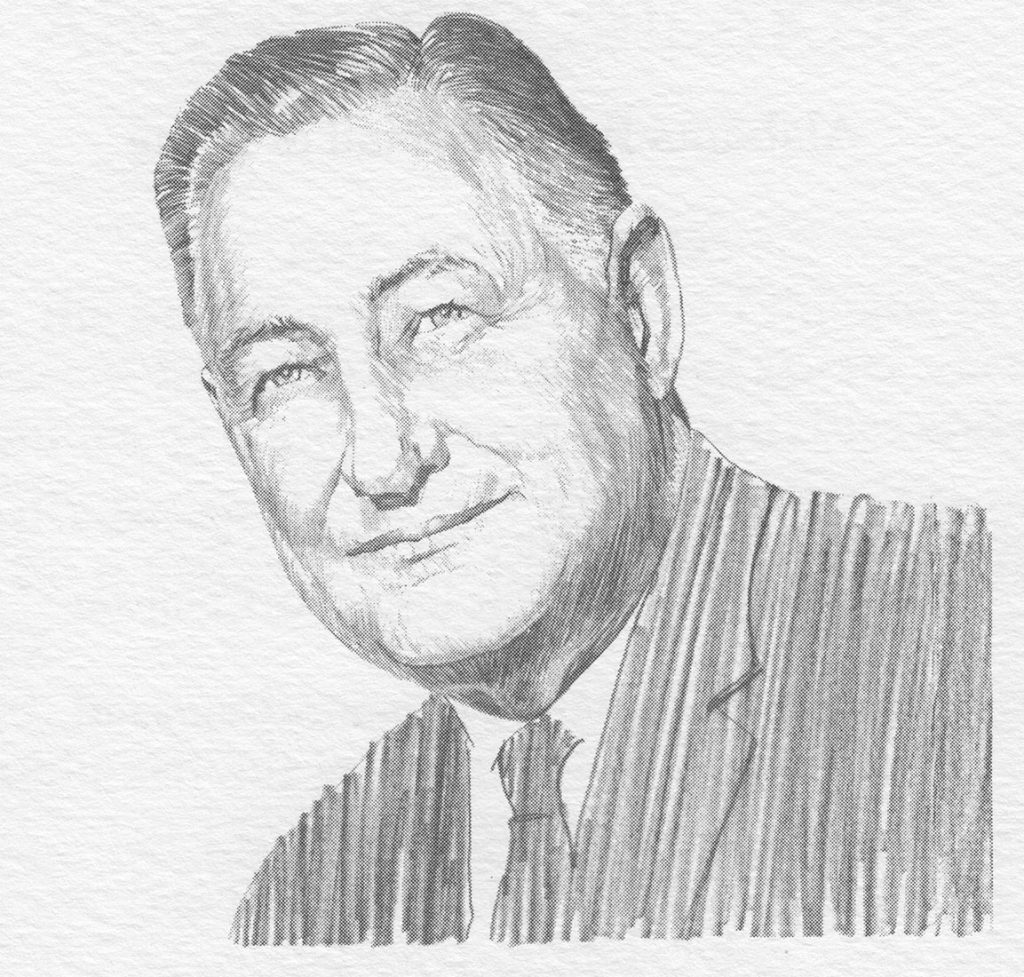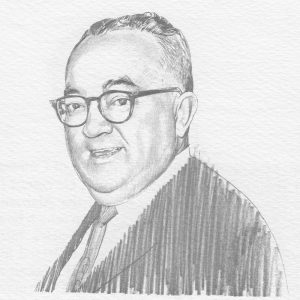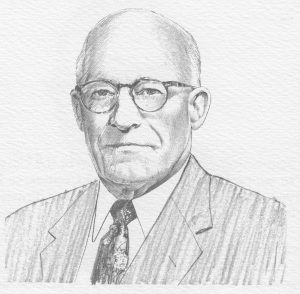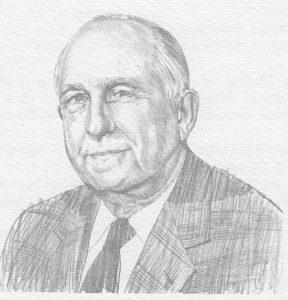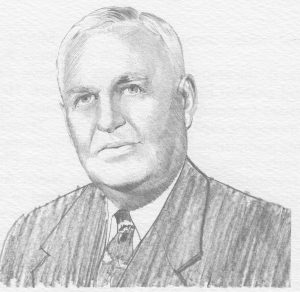The destiny and dreams of Glen Porter Brock, Sr. – presently the Honorary Chairman of Illinois Central Gulf Railroad – have long been intertwined with those of the railroad industry.
Son of Loren Ellsworth and Mable L. (Porter) Brock, he was born near Alden, Iowa, in 1896; but from the age of six, he lived in Palestine, Illinois, always within earshot of a train whistle. His father was a locomotive engineer and his brother a brakeman with the Illinois Central Railroad. Through them, the youngster experienced the excitement of the railroad industry, and he too longed to be a part of it. While still in school, sixteen-year-old Glen Brock began working as a caller clerk on the Illinois Central Railroad. This minor position intensified a dream that had been growing over the years he wanted to manage a railroad.
After graduating from Palestine public schools and Central Business College in Indianapolis, Indiana, the young man served in the Infantry at Columbus Barracks, Ohio, from June 1918 until the Armistice was signed November 11, 1918, when his unit was disbanded. The day he was discharged, young Glen Brock took the train from Urbana, Illinois. Still in uniform, with only $98 in his pocket, he enrolled in classes at the University of Illinois to help prepare himself to pursue his dream. During his college years, he disciplined himself to get by on only five hours of sleep each night so that he could gain time for both study and the jobs he held to pay his college expenses. He graduated in 1922 with a B.S. degree in Railway Administration.
Soon after graduation, Mr. Brock married his childhood sweetheart, Esther Goodwin. In December 1922, the newlyweds moved to Mobile, Alabama, where Mr. Brock had accepted a position as a cost accountant with the Gulf, Mobile, and Northern Railroad. Thus began a long and productive association with GM&N.
Mr. Brock became known for his hard work and innovative ideas. For example, in 1935, by which time he was serving as General Manager, he began a hostess service on passenger trains. Because he believed that the hostesses should represent the railroad’s commitment to friendly and dedicated service, each hostess was required to be a college graduate and be medically trained. The program was such a success that it was widely imitated throughout the railroad industry.
In 1940, when the Gulf, Mobile, and Northern merged with Mobile and Ohio Railroad to form the Gulf, Mobile, and Ohio, Mr. Brock was elected Vice President and General Manager of the combined system. His record of innovation continued. In 1946, he helped create a “highway post office” system. Service from the traditional mail car on each train had been limited to towns along the railroad. Under the new system, the new GM&O Railroad refitted a fleet of buses to post office specifications and charged the Postal Service a mileage rate for the “highway post offices.” The first successful route between Mobile and Union, Mississippi, was soon extended from Mobile through Meridian, Mississippi, St. Louis, Missouri, and as far north as Chicago. Also, under Mr. Brock’s guidance, in 1948, the Gulf, Mobile & Ohio became the first-class A Railroad to completely convert to diesel engines. Mr. Brock’s capabilities continued to be recognized by GM&O. From 1952-1957, he served as its Executive Vice President and General Manager. In 1957, he was elected President of the railway. In 1972, when GM&O merged with Illinois Central to become The Illinois Central Gulf Railroad, Mr. Brock became Chairman of the Board of Directors and served in that position until he retired in 1977 when he was named Honorary Chairman-the culmination of 66 years of service, in fifty-two jobs, in the railroad industry.
Mr. Brock has also utilized his expertise in directorial positions with GM&O Land Company, the New Orleans Great Northern Railroad Company, and Gulf Transport Company. He has been an alternate director for the Kansas City Terminal Railroad Company and a member of the National Freight Traffic Association. He has been a director for Protective Life Insurance Company of Birmingham, and the Mobile-based Home Savings and Loan Association, American National Bank and Trust Company, and Merchants National Bank.
No group has benefitted more from his humanitarian beliefs than the people of Alabama. A complete list of Mr. Brock’s civic and charitable activities and awards would fill several pages. He has served as committee chairman, vice president, and president of the Mobile Rotary Club. He has held major positions on the Mobile Chamber of Commerce and committee status with the Chamber of Commerce of the United States. In 1959, Governor John Patterson appointed him to the Alabama State Docks Advisory Board on which he served until 1963.
Mr. Brock’s interest in social improvement is reflected in his record of service to charitable organizations. He was the 1953 General Chairman for the Community Chest Campaign and later served as Campaign Chairman and President and Chairman of the Board for the United Fund of Mobile. Mr. Brock has also been involved as a member of the advisory boards and committees for the Mobile County and Providence Hospitals, the Mobile Mental Health Center, and the Mobile Association for the Blind. Because of his many years of dedicated service, he was named Mobilian of the Year in 1961.
The people of Mr. Brock’s home state of Illinois have also been aware of his outstanding business and civic record. He received an honorary Doctor of Laws degree from Illinois Wesleyan University in 1959 and was later chosen to be a trustee of that institution. The National Alumni Association of his Alma Mater, The University of Illinois, presented him with the “Illini Achievement Award” in 1969. Four years ago, Glen P. Brock was inducted into the Alabama Academy of Honor by the State Legislature.
Mr. and Mrs. Brock has two sons, Paul Warrington and Glen Porter, Jr., and seven grandchildren. They reside in Mobile, where Mr. Brock, even though retired, still maintains an “open-door policy” at his office for the employees of Illinois Central Gulf and the citizens of Alabama.

